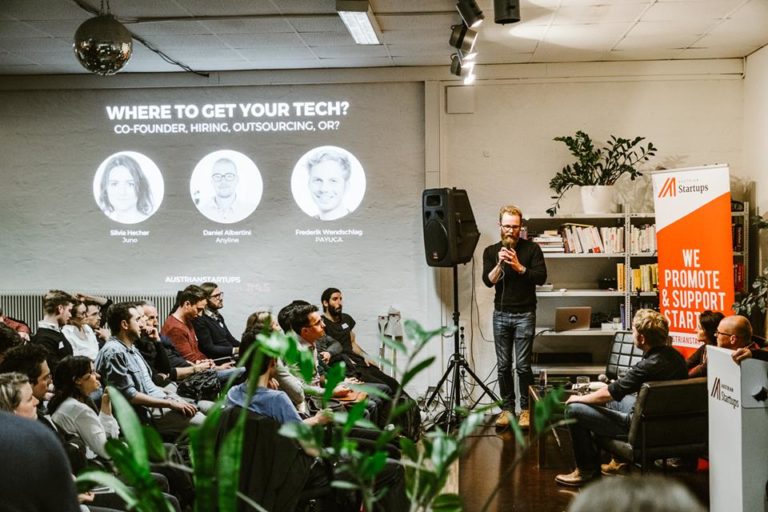The trials and tribulations of that ever-illusive Tech…
‘Where to get your tech?’ or as many consider, ‘How far can you take your business idea without a technical team member?’ Both are key questions that occupy founders’ thoughts, opinions are diverse and business growth models vary.
My name is Allie and I’m a newbie volunteer at AustrianStartups. Recently moving to Vienna myself, it is a question I asked too when I tried to found my first company whilst at university in London. Still, as a Startup enthusiast and a British native with much to learn, Austria to me is an interesting place to found a company – full of opportunity and from my recent experience, still a deep sense of do it yourself grassroots entrepreneurship which makes me excited about my time here. Last month, I attended my first AustrianStartups Stammtisch #45 where a few methods applied by some well-known startups to the topic ‘tech’ where discussed.
Silvia Hecher, Juno Fertility, outsourced with a limited technical knowledge but enough to communicate to a small agency and after the product launch learned that she needed in house. To the opposite, Anyline, having a team of 4 technical founders one of which, Daniel Albertini, was present for questioning. And finally, Fredrik Wendschlag, PAYUCA, a company that was built on an idea with founders from varied background without a tech guy, a bit of self-taught code and now a recently acquired a CTO. Of course, acknowledging that the product or sector the startup is in will ultimately determine tech, the conversation began…
Daniel quickly commented ‘Don’t find a tech guy! Hack a version by yourself,’ easy enough for a guy who started a company with 4 tech co-founders to say, no? But he had a point – you really want to at least test the proof of concept before spending a lot of money bringing in resources and technical help.
Fredrik, however, nuanced ‘getting the resources of another, either an individual or an agency you get very big very quickly’.
Daniel rephrased ‘At least bootstrap an MVP by learning to basic code,’ great idea, yes… and here’s the but… It does involve a commitment to learning which in some cases can leave the Startup worse off, let me explain using Silvia as an example.
Silvia led her health tech product with her domain experience, a medical background. If she had decided to learn to code, the time constraint alongside focusing her energy on basic code rather than the bigger picture would inevitably led Juno Fertility down a less solid path. Silvia made sure she knew enough to communicate her ideas with a technical person but didn’t take her learning any further – more time to focus on what she is good at.
Best time to bring on technical team members? The general consensus seemed to be after the MVP ‘You can easily hack or bootstrap an MVP with little technical background to test your product’ (this comment was again made by the panels resident tech guy Daniel – however it did seem agreed upon).
BUT, before the launch with real customers ‘Out of the study environment and into reality, the product changes, customers don’t always behave in expected ways and bugs will appear almost immediately – at this point you really want someone on the team, outsourcing can mean ‘waiting for days for the fix’ or you also lose the ‘feedback circle’ meaning that a full understanding of the code and system can get lost in long distance communication…
Or,
lost in badly built selfcode – comments from Frederik of bringing in a technical founder where the system already built and can frankly be a mess. This means a lot of time fixing ‘which created a greater workload than if they had been there earlier on’.
So, what do you look for in a CTO? When you are looking for a founder team the ‘fit’ is more important than even technical ability for both the potential CTO and current founding team. The CTO should be ‘more of a translator than a coder’ – there becomes a point in the future where the CTO starts to code less and less, you need someone who ‘understands where the product is going, who can bring ideas to that and also who knows what other talents and skills are needed in the team when it comes to expanding to achieve the goal.’
That said, finding the CTO is a j..o..u..r..n..e..y… and one which does not happen overnight, Silvia advertised for over 6 months receiving approximately 50+ CVs of which she interviewed 7. “I looked for some key aspects during the search ‘Ability to explain and clarity in the product’ someone who ‘believes in the product’ or ‘brings ideas about the code or the functioning already to the interview, already introducing new paths and directions for the company’”….
As you can see, criteria that is not so easy to find on paper… And it wasn’t! After hiring somebody for another role the correct CTO was found in their network. Life hack: Do not despair if you are currently in a ‘no tech bubble’!!! as your idea grows so will your network in a similar way.
Other founders from the crowded room also shared their advice, ‘As a CTO you need to be a good communicator.’ Or that also making sure that if you do decide to code yourself, ‘make sure you are aware of and fulfill any Austrian standard rules and regulations.’
And then finally but, perhaps the most interesting question of the evening, ‘Do you have to give away a lot of equity to bring on a CTO?’ – yes the equity so integral to start-ups early stages.
Answer: No (phew! To those with ideas but no tech) – However it can depend on how involved the CTO wants to become, for instance where they are in their own career development or as it was also put, ‘if you want an entrepreneurial CTO then that person will tend to want shares.’ Whilst this can be great, due to the person becoming invested in the product and the mindset of the company it came with a warning….
Be careful, and ‘Vesting’ should definitely be introduced – this involves planned equity over time, which even the 4 original tech founders at Anyline had agreed on, a pre-nup so to speak for business marriage.
My first AustrianStartups Stammtisch was a success, I learnt a lot and met many other like-minded people in my new home meaning that I can’t wait for the next Stammtisch on the 16th May – ‘How to find the right Investor?’.
KEYWORDS
CTO – chief technological officer
MVP – Minimum Viable Product, usually used with a test group or as initial proof of concept to attract investors.
DOMAIN EXPERIENCE – refers to an area of human endeavour, an autonomous computer activity, or other specialized discipline. Specialists and experts use and develop their own domain knowledge.
EQUITY – the value of the shares issued by a company.
BOOTSTRAP – self-starting process that is supposed to proceed without external input.
VESTING – planned equity over time of service.
© Markus Engelberger/graphicrecorder.at









